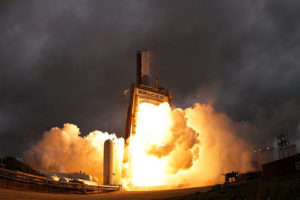
Congressional investigators are concerned about the safety of astronauts due to a newly discovered defect in SpaceX’s Falcon 9 rockets, the Wall Street Journal reports. The defect involves a pattern of cracking in turbine blades of the rocket. The main function of turbine blades is to drive the turbopumps that funnel propellant into the engines.
The WSJ claims that the defect may require changes in the design of the Falcon 9 rocket, thus deferring the first lunches of the rocket which was supposed to take astronauts to space soon as next year.
According to the WSJ, the draft of an upcoming report from the Government Accountability Office details all these concerns of the investigators.
NASA and American Air Force are among SpaceX’s customers.
“We do have work underway and it is due out later this month,” Charles Young, the managing director of GAO’s public affairs, told The Verge. “I can’t comment on the contents of the report until it is issued. It is still in draft form and we have not provided copies to any reporters.”
NASA’s acting administrator, Robert Lightfoot, also talked to the WSJ and said that NASA is working with SpaceX on the issue.
“We’re talking to [SpaceX] about turbo machinery,” and “we know how to fix them,” Mr. Lightfoot said.
According to SpaceX, the rocket engines have been designed to withstand cracking in the turbines, but their teams are working on the issue to get rid of the problem.
In an email to Reuters, SpaceX revealed that it has “qualified our engines to be robust to turbine wheel cracks. However, we are modifying the design to avoid them altogether,” said spokesman John Taylor.
SpaceX has NASA contracts to fly cargo to the International Space Station and start flying astronauts to the orbiting research laboratory as early as 2018.
“SpaceX has established a plan in partnership with NASA to qualify engines for manned spaceflight,” Taylor said.
Last month, SpaceX had resumed flights following a 4-month investigation into why a Falcon 9 rocket blew up when it was being fueled for a routine pre-launch test in Florida.
